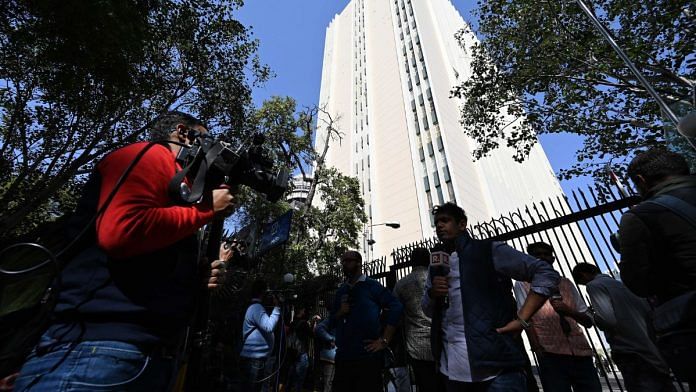New Delhi: The wholly Indian-owned entity — ‘Collective Newsroom’ — that is set to replace BBC World Service India will be a separate company, the British broadcaster has said.
“Collective Newsroom is a separate company and BBC is not and will not be the parent,” the BBC told ThePrint in an email response.
Under the lens in India for alleged FDI violations, the BBC announced Wednesday that it will restructure its Indian operations to comply with foreign investment rules.
Staffers working with the BBC’s six language services — BBC Gujarati, BBC Hindi, BBC Marathi, BBC Punjabi, BBC Tamil and BBC Telugu — will see their roles moved to Collective Newsroom under the restructuring, as will the members of the BBC India YouTube channel in English, the statement added.
However, the BBC said on its website that “the broadcaster’s English language newsgathering operation in India will remain with the BBC”.
The new entity is eyeing an April 2024 launch, led by four staffers of BBC India.
“Rupa Jha, currently the head of India at the BBC, will lead Collective Newsroom alongside Mukesh Sharma, Sanjoy Majumder and Sara Hassan,” BBC said on its website.
A BBC spokesperson said the company’s 260 staffers will be moved to Collective Newsroom.
Asked how the restructuring will affect employees’ pay scales, and if the BBC staffers in India will be asked to quit and join Collective Newsroom, the BBC spokesperson told ThePrint “those moving to work for Collective Newsroom will have contracts and agreements with Collective Newsroom”.
Individual details are being worked out, the spokesperson added.
Jha was quoted as saying on the website that audiences in India “can be assured that the BBC’s Indian language services and unique range of quality output will inform, educate and entertain audiences across our diverse and highly engaged country under the agreement between the BBC and Collective Newsroom”.
Also Read: Indian journalists should be grateful BBC lost the ‘impartiality’ battle
Move follows searches
Talking about the restructuring, a senior journalist said the “decision was taken to comply with the FDI cap of 26 percent for digital news outfits operating in India”.
“There were income tax raids at the BBC following the documentary on Prime Minister Narendra Modi,” the journalist added.
Searches were carried out at the BBC’s Delhi and Mumbai offices in February, weeks after the BBC aired a documentary in the UK that was critical of Modi. The government had denied any link between the two events.
Asked how the restructuring is affecting the employees at BBC, a source at the organisation said “it is a new move and only after individual details are worked out, will it be known how it affects all of us”.
The source added that, apart from the four editorial leads, five other members of the BBC are shareholders in Collective Newsroom.
(Edited by Sunanda Ranjan)
Also Read: 3 reasons why the Modi govt ordered an I-T raid on BBC — none of them makes sense



